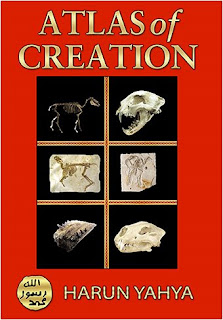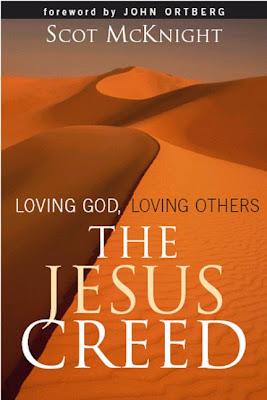Denis O. Lamoureux’s recent tome,
Evolutionary Creation: A Christian Approach to Evolution, is a masterpiece. Although I disagree with certain nuances of Lamoureux’s position and its implications, they are extremely minor when the entirety of his argument is laid out for theological inspection. Although I finished the book over a month ago, it’s taken me this long to really digest it. I half-expected to dismiss some of Lamoureux’s arguments after some time away from the book, but it ends up that I’ve added some of his more controversial views to my paradigm. Because there is so much to discuss, I’ve decided to review the book one chapter at a time.
The entire creation/evolution debate is not new. It has, in fact, been heavily debated for nearly 150 years. However, it is clear that one of the most dreadful developments in this scientifico-theological debate is the singular ability of both sides to redefine scientific and theological terms and categories in order to create false dichotomies and tear the other side down with ease:
Today the origin of the universe and life is often seen in black-and-white categories. For many people, the cosmos and its living organisms came about through one of two ways—either evolution or creation. In other words, the subject of origins is cast as a dichotomy . . . . It is an issue that is divided into only two simple positions. Regrettably, this either/or type of thinking fuels the popular perception that modern science and Christian faith are entrenched in an endless war. On one battle line, science is seen not only as a secular and godless enemy, but the theory of evolution is thought to have dealt a fatal blow to the existence of a Creator. On the other, Christianity and the biblical creation accounts are perceived as a hostile force against every new scientific discovery dealing with origins. This categorization has led numerous individuals into believing that they are forced to choose between two opposing sides: evolution or creation, science or religion, a world without God or one in which He reveals Himself through Scripture. (pp. 1-2)
This characterization of the debate is spot-on. I’ve been on both sides of the argument. Regular readers know how long I was entrenched in young-earth creationism and how recently it was that I abandoned the position with no regrets. Although I don’t subscribe to atheistic materialism, I do subscribe to a vibrant form of methodological naturalism (as opposed to philosophical or metaphysical naturalism) in which our universe is filled with readily observed causes and effects, available for inspection and rational explanation. As such, I’ve been able to look afresh at my old YEC position and recognize just how opposed the position is to the vast majority of scientific endeavors. What makes the YEC position considerably dangerous is its ability to compartmentalize the mind and allow ideology to override one’s intelligence. Don’t mistake my meaning—young-earth creationists aren’t intellectual idiots; there are plenty of extremely intelligent YEC scientists out there. My IQ didn’t suddenly change when I accepted the truths evolutionary science had to offer; rather, my paradigm changed. The way in which I viewed the world became un-compartmentalized, allowing me to relish scientific discovery and theological insight with a much more holistic view of the cosmos and natural history, as well as God’s hand in it all.
Lamoureux continues his introduction by distinguishing between two different ways of viewing the biological and cosmological evolutionary processes: teleological evolution, in which the cosmos reflects plan and purpose, or “intelligent design” (not to be confused with Intelligent Design [ID]), and dysteleological evolution, in which the cosmos is seen as purposeless, with apparent design as being merely illusory. Lamoureux then provides the reader with statistics from secular scientific journals revealing something that most traditional evangelicals may not realize: The majority of scientists are teleological evolutionists! How then could there be a godless conspiracy driving scientific discovery? Many evangelicals argue that so-called Darwinism is essentially atheistic, and it is only natural for those who subscribe to evolutionary theory to dive headlong into godless existentialism. However, it’s my suspicion that 99% of evangelical Christians haven’t read but a few Darwin quotes selectively chosen (and taken out of context) by those who disagree with him. Lamoureux writes:
Only a few years before his death in 1882, [Darwin] openly admitted, “I have never been an atheist in the sense of denying the existence of God.” Though Darwin’s religious views changed over the course of his life, the historical record reveals that he never embraced dysteleological evolution. (p. 9; emphasis mine)
Let me make this very, very clear: Evolution does not require one to become an atheist. Although Darwin may very well have dismissed belief in the God of the Bible and rejected Christianity, he was no atheist, and no one should feel pressured into believing otherwise. Materialism is, by nature, atheistic; but so-called Darwinism and evolution is not. Those who continue to utilize such phrases as “atheistic Darwinism” as a means of equating the two are only doing so in order to fuel the false dichotomy.
The term creationism is also the subject of unfair dichotomization. Certainly, creationism in its popular sense refers to so-called “special creationism,” which is characterized by either miraculous intervention to transform a material-less void over the course of six 24-hour days or miraculous intervention at certain stages of cosmic and biological history; but the evolutionary creationist (EC) position also affirms the existence of a Creator, albeit one who set the cosmos in motion at the moment of the so-called Big Bang and continues to sustain it by His power. Sadly, as Lamoureux points out, the conflation of certain interpretations of Genesis 1 with the concept of creation regrettably “leads to the common misperception both inside and outside the Church that six-day creation is the official Christian view of origins” (p. 10; emphasis in the original). However, evangelicals need not worry about the EC position; it is well within the boundaries of theological orthodoxy (for lack of a better term), as it affirms the historic Church’s position that the eternal Creator is distinct from His temporal creation, which is utterly dependent upon the Creator for its existence in terms of both origin (ex nihilo) and continuation; the main difference is that EC does not conflate the manner in which cosmos was created with the fact that it was created. What sets EC apart from other special creationists is that the existence of God and His hand in its governance is not something to be scientifically proven. Nor can it be.
The last subject Lamoureux discusses in his introductory chapter is the necessary distinction between different types of concordism: scientific, historical, and theological. Prior to reading Lamoureux’s book, my position on the inerrancy of the Bible was vague at best. Upon rejecting YEC in favor of EC, I began to differentiate between biblical inerrancy and biblical infallibility, leaning more toward the latter at the expense of abandoning entirely the concept of inerrancy. However, Lamoureux’s position that Genesis 1-11 concords only theologically with the rest of Scripture made me realize that the difference between inerrancy and infallibility was too simplistic. Certainly, I could adopt the common stance that the Bible is infallible in matters of faith and practice, but the concept of infallibility didn’t assist me in understanding the relationship of Genesis 1-11 with the rest of the Bible, especially when I recognized that those opening chapters don’t concord with either science or history (more on this in later chapters). What assisted me in coming to terms with the unscientific and unhistorical nature of Genesis 1-11 is the recognition that timeless eternal truths (what Lamoureux labels “inerrant and infallible Messages of Faith”) are present alongside ancient science and ancient history, both of which are, by modern standards, untrue. Thus, Lamoureux holds to a very unique understanding of biblical inerrancy, one that is counter-intuitive but makes sense of what we read as well as what we experience:
Theological concordism is the most important type of concordism. It claims that there is an indispensable and non-negotiable correspondence between the theological truths in the Bible and spiritual reality. The central purpose of Scripture is to reveal God, including His character, laws, and acts. Divine revelation also discloses the spiritual nature of the physical world. It declares that the cosmos and living organisms are creations of God and that they are very good (Gen 1:1, 31). Scripture affirms that the universe reflects the Creator’s glory, workmanship, and divine nature (Ps 19:1; Rom 1:20). And most significantly, the Bible reveals the two defining spiritual characteristics of humanity—we bear God’s Image and we are sinful (Gen 1:26-27; Gen 3; Rom 3:23). Despite the many ways Christians interpret the Bible and understand God’s creative method, these foundational theological truths always transcend the origins debate. Grasping the deepest truths in Scripture is not only an intellectual activity, but involves conviction and submission at a spiritual level. It takes “ears to hear” (Matt 11:15) the inerrant and infallible Messages of Faith, and it demands that we read the Bible on our knees. The primary purpose of the Book of God’s Words is to deliver spiritual Truth. (p. 15)
Thus, the vessels in which these spiritual truths are delivered are purely incidental. Through the use of ancient concepts of natural science and human history, God accomodated his theological message to an ancient people. To do otherwise—to reveal the scientific facts surrounding the true origin of the cosmos and life on earth—would have been to confound them to no end. Instead, God spoke to mankind in its scientific, historical, and intellectual infancy, much as a parent would take great pains not to overexplain things to a young child:
When revealing to the early Hebrews that God created the world and their community, the Holy Spirit descended to their level of understanding and employed their scientific and historical categories in order to communicate as effectively as possible. Our challenge as modern readers of the Bible is to identify these ancient vessels and to separate them from the life-changing Messages of Faith. (p. 19)
And this Lamoureux does very, very well. As a famous Jedi Master once said, “You must unlearn what you have learned.”







